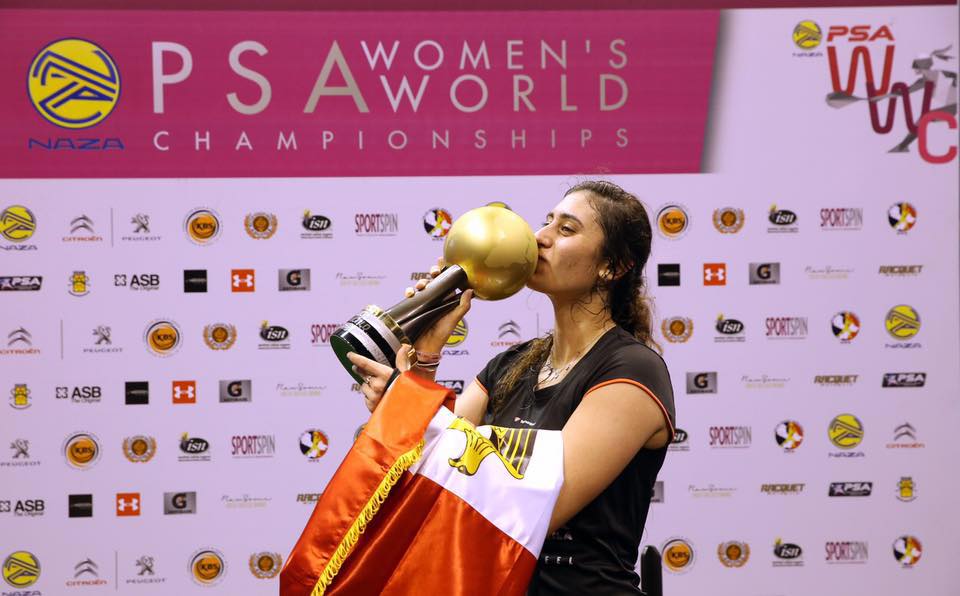Like this article? rabble is reader-supported journalism. Chip in to keep stories like these coming.
The youngest-ever woman world squash champion is a Muslim Egyptian.
Twenty-year-old Nour El Sherbini was crowned as the new world number one player at the beginning of May. In fact, the latest ranking shows that four of the world’s top 10 women squash players are Muslim Egyptians.
Yet unlike other Middle Eastern phenomenon no international press is flocking to Cairo and Alexandria. El Sherbini is the world number one player, Raneem El Welily number three, Nouran Gohar number six and Omneya Abdel Kaway is number seven. All of them train in these two Egyptian cities. The success of El Sherbini and other Egyptian women squash players have become a big story in Egypt, but not internationally.
Egyptians shared the pictures of El Sherbini showing strength and muscle on their Facebook and Twitter feeds, as the young player beat her opponents at the PSA Women’s World Championship, held in Malaysia. El Sherbini became a household name in a country obsessed with male soccer players.
The success story of El Sherbini has many elements of a newsworthy story that can have international appeal. It’s a first! El Sherbini is the youngest player to win, the first Egyptian woman and the first Muslim woman to win the squash World Championship.
The story is about a trend or a phenomena that’s been brewing in the Middle East. In March, five of the top 10 women world squash players were Egyptians. That number went down to four in May but still almost half of the world top women squash players train in Egypt.
It’s a story about triumph of the underdogs. It’s a story about women players from a Middle Eastern country beating players from wealthier western countries. I had the pleasure of meeting El Welily and Abdel Kaway in Edmonton, Alberta, when they won second place in the 2006 Women’s World Team Squash Championships. The young Egyptian players had no coach or support staff accompanying them, just one official delegate.
Islam only of interest to West when as a barrier
International sports outlets did mention El Sherbini’s win. However, her story and the stories of the other Egyptian women top players largely remain untold on the international stage. The one missing ingredient in their feel-good stories, it seems, is conflict.
The religion of an athlete isn’t usually a factor, unless of course their faith is Islam and there is some sort of conflict as a result of being a Muslim. Try Googling “Muslim women squash players.” The most covered story about a Muslim woman squash player is the story of the number one player in Pakistan, Maria Toorpakay. She has been training in Toronto since 2011.
Toorpakay who is ranked number 56 in the world has a remarkable story of pretending to be a boy for 16 years so she can compete in sports in her homeland. You can read Toorpakay’s memoir or hear Toorpakay’s story in her recent interview on CBC’s The Current.
Sherbini didn’t face the harrowing hardships that Toorpakay went through. Islam wasn’t an adversary for Sherbini. Sherbini and the other top Egyptian women players don’t wear a hijab, so covering up wasn’t an issue either when it comes to competing.

Sherbini’s used the Muslim phrase of thanking god, that Egyptians commonly use after any success in her first Tweet announcing winning the world championship. The number one player’s supportive mother wears a hijab and she tries to travel with her daughter as she competes internationally. So there are several public signs of Sherbini’s faith.
Squashing stereotypes
Yet, the fact that Sherbini is a Muslim is hardly ever mentioned or alluded to in the few media stories about her. When there is no conflict between a Muslim player and her faith, then there is no story at all it seems.
Good stories happen in the Muslim world but they just don’t make it in the international section of the news. The success stories of El Sherbini, El Welily, Gohar, and Abdel Kaway could have provided a good chance to balance out the usual framing of Muslim women as being in conflict with Western civilization.
Sheribini’s squashes the typical stereotypes of the weak, crushed and oppressed Muslim woman who’s in need of help. She doesn’t need anyone’s sympathy or aid. Sheribini’s got a supportive family, droves of fans in her nation, and local sponsors.
But perhaps she wouldn’t mind some international recognition for her achievement — or maybe just a congrats tweet @noursherbini.
Several Canadian post-colonial feminists published works regarding the stereotypical portrayals of Muslim women in Western media as oppressed, in need of saving, and in conflict with Western norms and values, including Sherene Razack, Sunera Thobani and Yasmin Jiwani.
Dalia Thamin worked as a radio and TV producer in Canada and the Middle East for 13 years, including working for CBC Radio in Edmonton for 10 years. Thamin is currently a freelance writer and a graduate student in cultural studies at Queen’s University. Her research touches on the media representation of Muslim women.
Image: Facebook/Nour el Sherbini
Like this article? rabble is reader-supported journalism. Chip in to keep stories like these coming.



